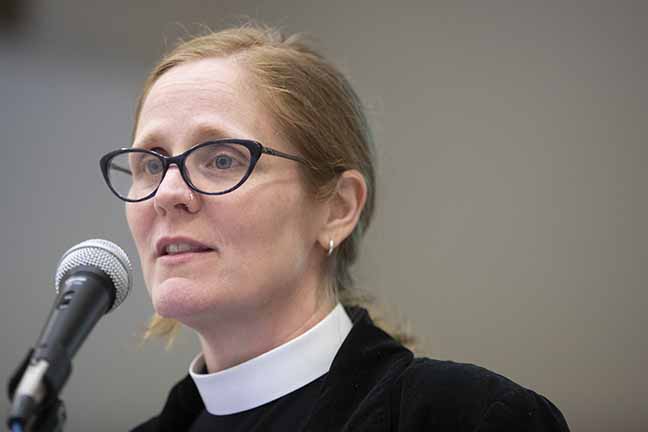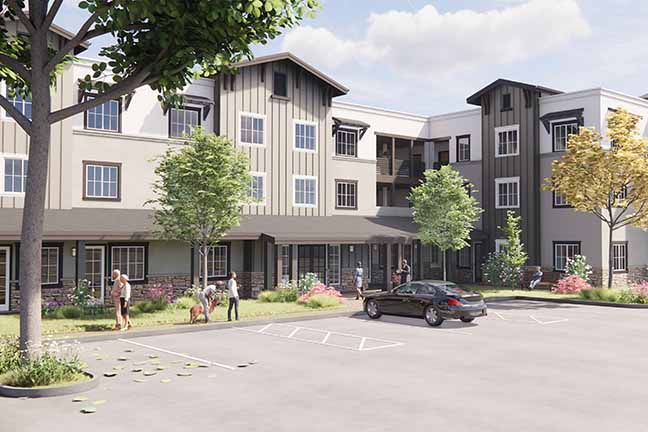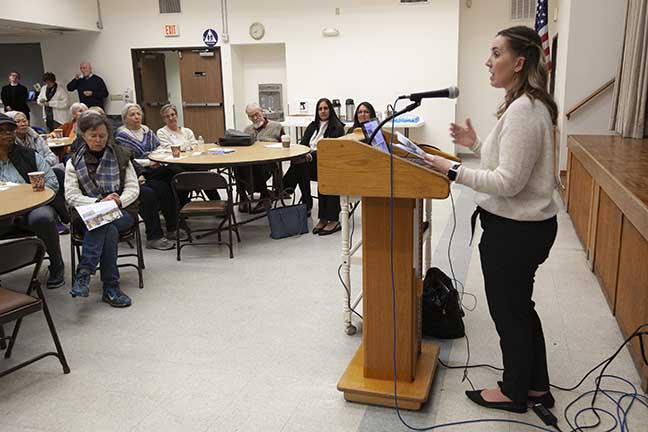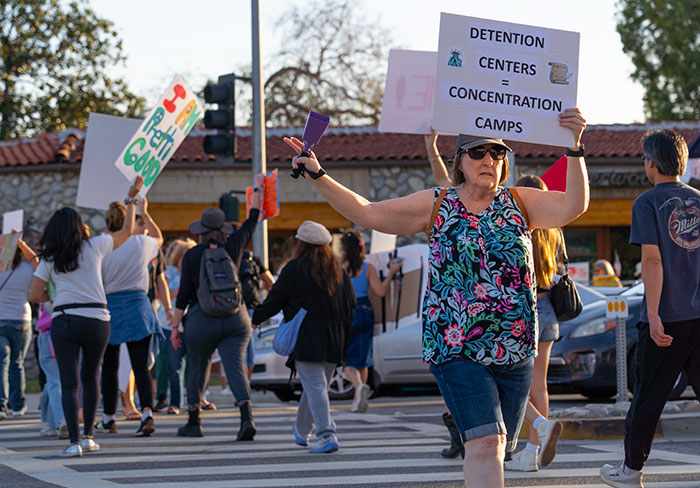St. Ambrose to redevelop land for affordable housing

St. Ambrose Episcopal Church rector Jessie Smith. Courier photo/Steven Felschundneff
by Steven Felschundneff | steven@claremont-courier.com
For years housing advocates and city planners alike have viewed parking lots at religious institutions as vastly underutilized land that could be redeveloped into much needed affordable housing.
Churches are not alone. The amount of land dedicated to parking at shopping malls and retail establishments has also become a target for redevelopment, particularly since the state has ramped up its efforts to compel cities to plan for more housing.
But the parking lots at religious institutions represent a particularly enticing untapped resource, because they are generally only in use for a few hours one day a week.
And as church attendance rates have dropped over the years, religious institutions statewide have sought ways to develop their land but have faced tremendous obstacles, including an approval process that can take years.
Now, many congregations are hoping Senate Bill 4, which became law January 1, will help them break ground. Under SB 4 religious institutions and certain nonprofit schools can build affordable housing on their land “by right,” meaning the projects would not be subject to public hearings or required to conform with existing zoning, and cannot be derailed by environmental impact lawsuits.
St. Ambrose Episcopal Church Rector Jessie Smith told the Courier last year it has been a dream of hers that the church would one day be able to provide affordable housing by developing a portion of its parking lot. That dream is now closer to becoming a reality as the church has partnered with the developer National CORE to construct a 59-unit affordable housing complex on the south side of its property at 830 W. Bonita Avenue.
“The future of church is going to be different than it has been in the last two generations,” Smith said last week during a public meeting at St. Ambrose to discuss the proposed project.
“So for the last several years our congregation has been discerning what God is calling us to do next,” Smith said. “And we realized we were sitting on an underutilized piece of land, and we are in the midst of a housing crisis. The needs of our neighbors and our passion for serving and the assets that we currently have brought us to discern that God was calling us into the ministry of developing affordable housing.”

A concept rendering of proposed affordable housing at St. Ambrose Episcopal Church. Rendering/courtesy of National CORE
The proposed building will be two and three stories tall, with 56 one-bedroom and three two-bedroom apartments. Onsite amenities include a community room, computer nook, covered porch areas, fenced in pet run, outdoor lounge, and barbeques. One two-bedroom home will be set aside for the onsite manager.
Thirty of the apartments will be for low income seniors at least 62 years old. For these units, National CORE has set its income target at 80% or less of the area median income, which for 2023 would be $55,000 for a single person. However, William Diepenbrock, assistant vice president of marketing and communications, cautions that 80% of AMI is a maximum income, so many residents will earn less. In addition, in a few years when the building is ready to be occupied the area median income in Los Angeles County will likely be higher. No future tenant will be asked to pay more than 30% of their income on rent.
“If the range ends up being 30% to 80%, they could earn far less and qualify for much lower rents. And the cap could end up lower than the 80% figure,” Diepenbrock wrote in an email.

National CORE Senior Project Manager Sarah Walker at last week’s meeting at St. Ambrose Episcopal Church. Courier photo/Steven Felschundneff
The remaining 28 units will be set aside as permanent supportive housing where the prospective residents will be currently unhoused or in danger of losing their housing. Those tenants would also need to be at least 62, but their income threshold would be much lower, at 30% of the area median income.
People will be placed in the permanent supportive housing units through Los Angeles County’s coordinated entry system, which screens people based on a lengthy application that assesses individuals’ needs for housing, how long they have been homeless, and if they are medically fragile. Fair housing laws prevent the company from prioritizing Claremont’s unhoused population.
Because the building will serve as a permanent home and not a shelter or temporary housing, services would be offered to residents but not required.
According to National CORE, each future tenant would have to pass a thorough screening, including a criminal background check. No sex offenders or people convicted of manufacturing methamphetamine could rent an apartment. Applicants may also be rejected if they have been “arrested, convicted or engaged in drug-related or violent criminal activity within the prior five years.”
The company calls itself a “vertically integrated organization,” meaning it serves as general contractor, developer, property manager, and will provide onsite resident services.
“National CORE is an owner operator, so we are going to build the housing and we are going to stay onsite and provide property management,” National CORE Senior Project Manager Sarah Walker said during last week’s meeting. “So that means we have a vested interest in making sure what we are designing and building is high quality and it’s going to last. We don’t walk away from the properties, we stay on and manage them in perpetuity.”
The company will not need the streamlined approval process offered by SB4, largely because the site is already zoned for multifamily use. It will take advantage of other state laws that allow for an 80% density bonus as well as reduced parking requirements. Also, the city identified the church’s parking lot as a potential location for affordable housing in its 2021-2028 housing element, ensuring the by-right status of the development.
The project will still have to meet objective standards in Claremont’s municipal code, and the approval process will be handled by the city’s planning department.
St. Ambrose will lease the land to National CORE and will receive an annual payment from the company once the complex is built and occupied.
According to the project’s website, for the next year or more National CORE will be nailing down the financing and designing the building and grounds. Construction could begin in 2026 with an anticipated opening in early 2028.








0 Comments